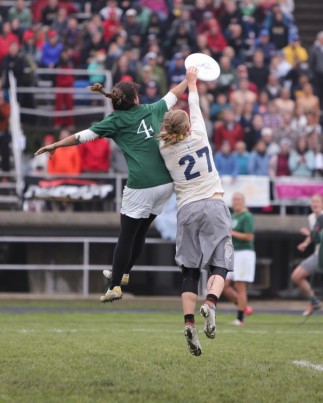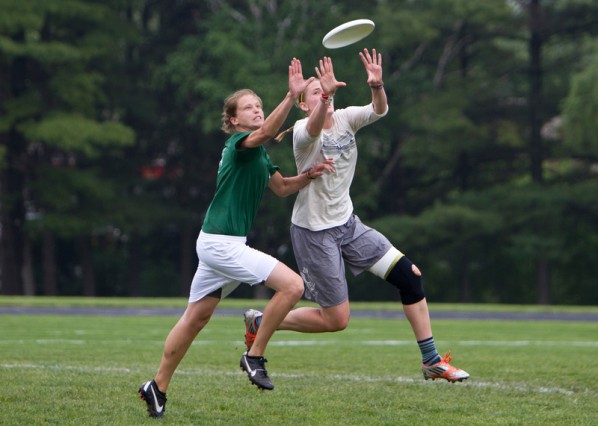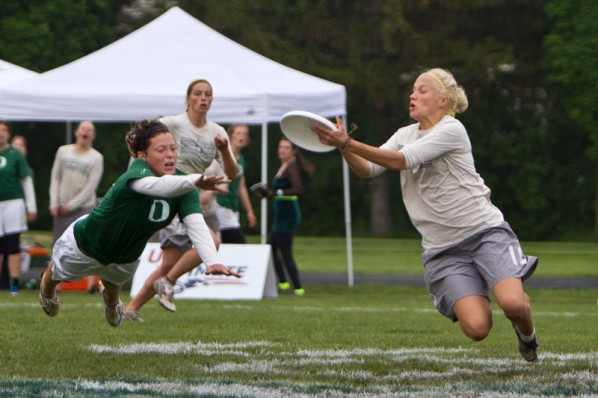As a young basketball player, I attended my very first basketball camp taught by the Pius XI High School basketball great, coach Joel Claassen. For those of you unfamiliar with Wisconsin high school sports history, Claassen coached the Lady Popes to 14 state basketball championships and 16 conference championships, among other countless successes as a coach and player. On that humid summer day in the crowded, un-airconditioned gym, it was only minutes until I was first taught the age-old phrase, “Offense wins games, but defense wins championships.” The women’s division final of the 2013 Division-1 College Championships proved that this phrase rings true in Ultimate. If anyone wants to argue otherwise, let’s revisit Oregon’s Memorial Day victory.
In many ways, Oregon’s coach Lou Burruss reminds me of Claassen in the way he speaks, in the way he leads, and in his coaching attitude. He is THE coach that every college girl who plays Ultimate wants to play for. There is something special about his Clown Tent philosophy, the way he interacts with his players, and emphasis on field possession offense –but most of all, it his ability to coach defense.
Any team that has faced Fugue in recent years cannot argue with this methodology. Though I have only played Fugue twice in my college career, I can certainly attest to the frustration of playing against Oregon on offense. In the countless number of games I have watched Fugue play, I am always mesmerized by the way Oregon’s defensive intensity strikes fear into the minds of their opponents. But here is the almost crazy thing: the whole point behind the field position-oriented offensive strategy lies in the team’s passion for playing defense.
Sure, Ashley Young’s layout D will be talked about for years, but it is a passion that extends to more than just one key play. It was Oregon’s defensive pressure as a whole that helped them secure a title over a Carleton team that stood out on offense all season long.
Shut Down the Biggest Threat
Oregon was given the monumental task of taking Julia Snyder out of the game. Snyder’s command on offense centers on her versatility as a player: she can seamlessly transition between handling, cutting, working under, going deep, throwing goals, scoring goals, or patiently working against a zone. Teams had no answer for her athleticism, explosive change of directions, and throwing arsenal throughout the weekend.
Zahniser is an obvious choice in an individual matchup, with quick change of direction, awareness of her body positioning, and effective mark. Snyder’s effect was diminished substantially, especially in the second half, when Carleton most-needed her impact to make plays on offense.
Though Zahniser most-often matched up on Snyder, several other Oregon players rotated in. While Carleton kept their studs on the field for nearly every point, Oregon could keep Zahniser fresh by not matching her up on Snyder every point she played, just most of them.
Additionally, when Snyder had the disc, Fugue tightened up on downfield defense. It certainly is difficult to throw something game-changing when the receivers are not open. Fugue’s defensive fundamentals were strong enough to contain her throwing arsenal, as defenders positioned themselves to take away the best option, and worked to continue to contain as the stall count rose.
Handler D Shuts Down Handler O
Carleton’s handlers had been the key to their success all weekend. Anna Reed, Kirstie Barton, Taylor Want, and Snyder had been rewarding the ability of downfield cutters to create space by throwing to that space. Disrupting offensive flow relied on shutting down these four throwers and preventing them from getting the disc. Sounds easy, right?
It certainly was not easy for every other team at the College Championships who faced Carleton. Even Washington, a team that prides itself on intense handler defense, could not shut down or slow the momentum of the chemistry of Syzygy’s assertive, dominant handlers. The problem was that these other teams did not have enough fundamentally sound, explosive handler defenders. But Oregon certainly did.
Off-the disc, Jesse Shofner, Alex Ode, and Molly Munson effectively worked with the mark to challenge handler movement. Their physical style and ability to explode and change directions laterally made it incredibly difficult for the off-disc handlers to get open. From the stands, I could see Shofner, Ode, and Munson focused on the hips of their opponent, not on their eyes, feet, or torso. They dictated the space that the handlers had to work with, and it usually meant hitting a risky, inside forehand to an up-field strike cut. In that wind and with a wet disc, I would be happy if that was the look I had to give up on D.
When they were on the disc, they were a step off, and aware of the space in which they allowed a throw to go off. They were moving their feet quickly, with small chopping steps, as opposed to lunging or taking huge lateral steps. In the middle of the field, they were more straight up on the mark, forcing a huck toward the sides of the field that was at-risk for exposing the tilt of the disc to the elements present in the stadium. When the disc was on the trap side, they were really taking away the around, and trusting their off-disc teammates to be positioned properly. It was effective and fundamentally sound.
Mix It Up Early and Often
Oregon mixed up their looks a lot throughout the game, but most of all, in the first half while they were struggling to contain Carleton’s deep game. Fugue played with individual matchups, switching Anna Almy for Morgan Zajonc on Flannery McArdle, keeping fresh legs on Marley Hartman-Filson, and rotating handler defenders on Carleton’s standout throwers. Oregon also switched up junk sets with force-middle person defense, and traditional zones to try to slow the Syzygy offensive strike.
Teams watching this game should realize that they cannot win a game with one or two strategies. Even throwing different looks into the mix for a few throws that are not your team’s strong suit can give your opponent a different look to overcome. Maybe the chaos of a less-effective zone might confuse your opponent even more. Most of all, keep your opponent guessing.
Footwork, Footwork, Footwork
If you watched Fugue’s defensive performance in the finals game and do not have the goal to work on your defensive fundamentals in the off-season, you’re crazy. There lies a common theme in this article, and it focuses on the footwork of Fugue’s top defenders.
I know that looking forward into my club season, I intend to continue to focus on defensive footwork after seeing it in action. It is not just quick change of direction, it is about minimizing the amount of steps you have to take to keep your movement efficient. It is about focusing on making your first movement forward (or to the direction in which you’re moving), and not having to take that “backstep” before you go forward. When it comes to defense, you can be as fast as the next person, but if they take one fewer step to reach that top speed, you are not in position to make a play.
Fugue even focuses on footwork in their pre-game warmups. They set up a series of cones in about a 20 yard space, and work on moving laterally, starting and stopping, quickly accelerating, chopping their feet, drop steps – heck, if it relates to change of direction, they probably do it before their game. In other words, Oregon focuses on footwork before they even touch a disc.
Athleticism is Exciting
I have had countless conversations over the years about why viewership in women’s sports is dwarfed in comparison to our men’s counterparts. The argument I receive most often is the lack of athleticism and explosiveness in the women’s version of any sport (well, except for maybe women’s volleyball over men’s volleyball, or women’s fastpitch softball over men’s fastpitch softball).
Comparing the two finals games, the women’s division finals had more layout blocks, more athletic grabs on D, and displayed intense, physical defense. Yeah, there were a lot of skies and awesome throws, but the defensive play, especially by Fugue, made the game standout from the men’s final.
I get it, Tyler DeGirolamo is really good. But just think if someone was capable of playing defense on him to make plays exciting, that would be what I wanted to watch. But based on what I saw of Central Florida, I think that they spent more time this season on offense based on their throwing decisions (UCF’s throwing ability and throwing vision throughout the weekend was incredible, especially in their semi-finals game).
The scores of the open and women’s division finals games were the same (granted the game was closer at half-time in the women’s finals game), but the discussion among fans was completely different. People were relatively satisfied in seeing the women’s game, and I feel pride in that. Watching Oregon on the field makes me excited to be a player in the women’s division. Most of all, it makes me excited for the future of the sport.
It All Goes Back to Defense
I think for all of us, there was a defining moment that changed your outlook on the sports you play. For me, it happened at a middle school basketball camp when the king of a dynasty instilled the importance of defense in the sport I loved, and I have carried it since.
As I drove to Milwaukee on Monday night, I replayed the highlights that I saw at the 2013 College Championships. The first that came to mind was a point where Shofner played flawless handler defense against Carleton in the second half of the women’s finals. I realize that I am probably in the minority who remembers that before Young’s layout D. Maybe I’m crazy for loving fundamentally sound defense as much as I do, but it says something when your team can be up by that much and the pressure does not slow down.
Ultimately, I know there were many kids in that stadium watching the game, and probably even more who were watching online. All I can do is hope they had that “ah ha!” moment as Oregon won another title, and that those kids will love defense until the day they die.
Feature photo by Alex Fraser (Ultiphotos).











Comments Policy: At Skyd, we value all legitimate contributions to the discussion of ultimate. However, please ensure your input is respectful. Hateful, slanderous, or disrespectful comments will be deleted. For grammatical, factual, and typographic errors, instead of leaving a comment, please e-mail our editors directly at editors [at] skydmagazine.com.